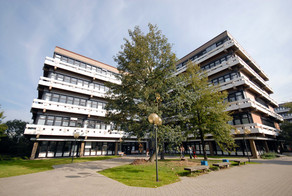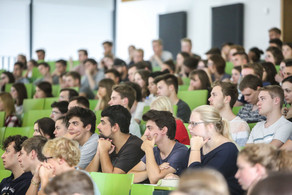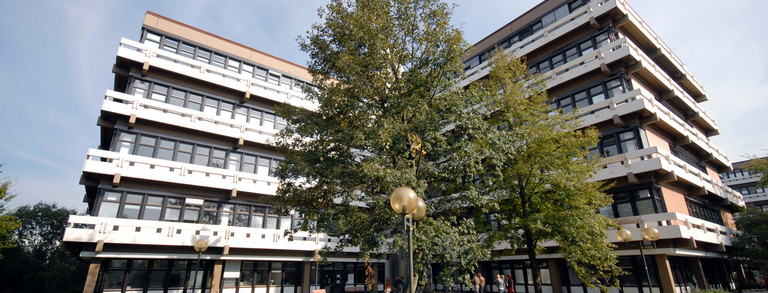Dr. Jens Mazei
Arbeitsschwerpunkte
- Verhandlungen und Konfliktmanagement
- Diversity
- Technologie
- Teamarbeit
- Open Science
Sprechzeiten
Donnerstag, 14-15 Uhr
Weitere Informationen
Mazei, J., Backhaus, N., Wöhrmann, A. M., Brauner-Sommer, C., & Hüffmeier, J. (2023). Similar, but different: Gender differences in working time arrangements and the work–life interface. Collabra: Psychology, 9(1), 87546. doi.org/10.1525/collabra.87546
A well-known phenomenon in many societies is that, on average, women (as compared to men) work fewer paid hours but also engage in more caregiving. That is, women are more likely to work part-time, whereas men are more likely to work overtime. Yet, of course, there are also many women working overtime, just like there are many men who work part-time. In this research, we asked: Do women and men differ as to why they work part-time or overtime? And yes, they did! We observed that women who worked part-time (as compared to men working part-time) were more likely to do so for personal or family reasons. Moreover, women who worked overtime (as compared to men working overtime) were more likely to do so in order to step in for colleagues as well as less likely to do so to attain additional income. Altogether, women and men had slightly different reasons for working a certain number of hours. This knowledge might be helpful for organizations that aim to provide working conditions that serve the potentially varying interests of their employees.
07-09/2024: Elternzeit
02-03/2024: Urlaub anlässlich der Geburt unseres Kindes
Seit 11/2022: Wissenschaftlicher Beschäftigter
Sozial-, Arbeits- und Organisationspsychologie
TU Dortmund
10/2017 - 10/2022: Akademischer Rat auf Zeit
Sozial-, Arbeits- und Organisationspsychologie
TU Dortmund
06/2017: Promotion zum Dr. rer. nat.
Organisations- und Wirtschaftspsychologie
Westfälische Wilhelms-Universität Münster
02-03/2016 & 08-09/2016: Gastwissenschaftler
Stony Brook University, Stony Brook, NY, USA
09/2015 - 09/2017: Wissenschaftlicher Mitarbeiter
Sozial-, Arbeits- und Organisationspsychologie
TU Dortmund
04-07/2015: Lehrauftrag
Sozial-, Arbeits- und Organisationspsychologie
TU Dortmund
09-11/2013: Gastwissenschaftler
DePaul University, Chicago, IL, USA
09/2013 - 08/2015: Wissenschaftlicher Mitarbeiter
DFG-gefördertes Forschungsprojekt „Prozessgewinne in Teamverhandlungen durch explizite Zuweisung von Teilaufgaben”
Bundesanstalt für Arbeitsschutz und Arbeitsmedizin (BAuA), Dortmund
04/2012 - 03/2015: Teilnahme am DFG-geförderten Graduiertenkolleg „Vertrauen und Kommunikation in einer digitalisierten Welt“
Westfälische Wilhelms-Universität Münster
11/2011 - 08/2013: Wissenschaftlicher Mitarbeiter
Organisations- und Wirtschaftspsychologie
Westfälische Wilhelms-Universität Münster
11/2011 - 06/2017: Promotionsstudium
Organisations- und Wirtschaftspsychologie
Westfälische Wilhelms-Universität Münster
2006 - 2011: Studium der Psychologie
Westfälische Wilhelms-Universität Münster
Artikel in Zeitschriften mit Peer-Review-System
- Mazei, J., Bear, J. B., Schaumberg, R., & Hüffmeier, J. (accepted). Explaining gender differences in negotiation: A close replication of Amanatullah and Morris (2010). Journal of Experimental Psychology: General.
- Mazei, J., Grabowksi, J., & Hüffmeier, J. (accepted). Which strategy to implement? Expanding the knowledge on the specific strategies that women do (not) use in salary negotiations. Negotiation and Conflict Management Research.
- Mazei, J., Rudolph, C. W., Zacher, H., & Hüffmeier, J. (2025). Don't put all of your eggs in one basket: Multiverse analysis in applied psychology. Journal of Applied Psychology. Advance online publication. https://doi.org/10.1037/apl0001291
- Bowles, H. R., Mazei, J., & Liu, H. H. (2024). “When” versus “whether” gender/sex differences: Insights from psychological research on negotiation, risk taking, and leadership. Perspectives on Psychological Science. Advance online publication. doi.org/10.1177/17456916241231584
- Bear, J. B., Pinkley, R., Barsness, Z., Mazei, J., Bhatia, N., & Sleesman, D. (2023). Gender, pay transparency, and competitiveness: Why salary information sometimes, but not always, mitigates gender gaps in salary negotiations. Group Decision and Negotiation, 32, 1143–1163. doi.org/10.1007/s10726-023-09837-x
- Lietz, M.,* Mazei, J.,* Mertes, M., & Hüffmeier, J. (2023). Are strategies for women in compensation negotiations more appealing when it is explained how they are meant to impact negotiation outcomes? Psychology of Women Quarterly, 47(1), 80–112. doi.org/10.1177/03616843221128484 (The asterisk denotes a shared first authorship.)
- Mazei, J., Backhaus, N., Wöhrmann, A. M., Brauner-Sommer, C., & Hüffmeier, J. (2023). Similar, but different: Gender differences in working time arrangements and the work–life interface. Collabra: Psychology, 9(1), 87546. doi.org/10.1525/collabra.87546
- Mazei, J., Bear, J. B., & Hüffmeier, J. (2023). When and why do men negotiate assertively? It depends on specific threats to their masculinity and the negotiation topic. Psychology of Men and Masculinities, 24(2), 137–148. doi.org/10.1037/men0000420
- Torka, A.-K., Mazei, J., Bosco, F., Cortina, J., Götz, M., Kepes, S., O’Boyle, E., & Hüffmeier, J. (2023). How well are open science practices implemented in industrial and organizational psychology and management? European Journal of Work and Organizational Psychology, 32(4), 461–475. doi.org/10.1080/1359432X.2023.2206571
- Torka, A.-K., Mazei, J., & Hüffmeier, J. (2023). Are replications mainstream now? A comparison between support for replications expressed in the policies of social psychology journals in 2015 and 2022. Social Psychological Bulletin, 18, 1–22. doi.org/10.32872/spb.9695
- Ugwu, F. O., Enwereuzor, I. K., & Mazei, J. (2023). Is working from home a blessing or a burden? Home demands as a mediator of the relationship between work engagement and work-life balance. Applied Research in Quality of Life, 18, 341–364. doi.org/10.1007/s11482-022-10084-6
- Ugwu, F. O., Onyishi, I. E., Ugwu, L. E., Mazei, J., Ugwu, J., Uwouku, J. M., & Ngbea, K. M. (2023). Supervisor and customer incivility as moderators of the relationship between job insecurity and work engagement: Evidence from a new context. Economic and Industrial Democracy, 44(2), 504–525. doi.org/10.1177/0143831X221078887
- Mazei, J., Bear, J. B., & Hüffmeier, J. (2022). Avoiding backlash or proving one’s manhood? Beliefs about gender differences in negotiation. Group Decision and Negotiation, 33, 81–110. doi.org/10.1007/s10726-021-09757-8
- Mazei, J., Mertes, M., Torka, A.-K., & Hüffmeier, J. (2022). Why we sometimes need different measures. Personality Science, 3, 58–61. Part of the following collection: Open commentaries to “Ten steps toward a better personality science: How quality may be rewarded more in research evaluation” (Leising et al.). Personality Science, 3, 1-61. doi.org/10.5964/ps.9227
- Mertes, M., Mazei, J., Gemmecke, C., Hüffmeier, J. (2022). Short-term effects of authority concessions to terrorist hostage-takers: Stability and generalizability of the concession effect. Negotiation and Conflict Management Research. 15(2), 124–147. doi.org/10.34891/20211105-533
- Nohe, C., Hüffmeier, J., Bürkner, P., Mazei, J., Sondern, D., Runte, A., Sieber, F., & Hertel, G. (2022). Unethical choice in negotiations: A meta-analysis on gender differences and their moderators. Organizational Behavior and Human Decision Processes, 173, 104189. doi.org/10.1016/j.obhdp.2022.104189
- Mazei, J., & Hüffmeier, J. (2021). Are women less likely to ask than men partly because they work fewer hours? A commentary on Artz et al. (2018). Meta-Psychology, 5, 1–12. doi.org/10.15626/MP.2020.2535
- Mazei, J., Zerres, A., & Hüffmeier, J. (2021). Masculinity at the negotiation table: A theory of men’s negotiation behaviors and outcomes. Academy of Management Review, 46, 108–127. doi.org/10.5465/amr.2017.0570
- Torka, A.-K., Mazei, J., & Hüffmeier, J. (2021). Together, everyone achieves more—or, less? An interdisciplinary meta-analysis on effort gains and losses in teams. Psychological Bulletin, 147, 504–534. doi.org/10.1037/bul0000251
- Schäpers, P., Windscheid, L., Mazei, J., Thielsch, M., & Hertel, G. (2021). “Like will to like” or “opposites attract”? Management board diversity affects employer attractiveness. Gender in Management, 36, 569–590. doi.org/10.1108/GM-10-2019-0182
- Mazei, J., Mertes, M., & Hüffmeier, J. (2020). Strategies aimed at reducing gender differences in negotiation are perceived by women as ineffective. Sex Roles, 83, 580-594. doi.org/10.1007/s11199-020-01130-4
- Mertes, M., Mazei, J., & Hüffmeier, J. (2020). "We do not negotiate with terrorists!" But what if we did? Peace and Conflict: Journal of Peace Psychology, 26, 437–448. doi.org/10.1037/pac0000446
- Hüffmeier, J., & Mazei, J. (2019). Symmetrical conflicts also allow for the investigation of attack and defense. Behavioral and Brain Sciences, 42, E125. doi.org/10.1017/S0140525X19000724
- Hüffmeier, J., Filusch, M. A., Mazei, J., Hertel, G., Mojzisch, A., & Krumm, S. (2017). On the boundary conditions of effort losses and effort gains in action teams. Journal of Applied Psychology, 102, 1673-1685. doi.org/10.1037/apl0000245
- Windscheid, L., Bowes-Sperry, L., Mazei, J., & Morner, M. (2017). The paradox of diversity initiatives: When organizational needs differ from employee preferences. Journal of Business Ethics, 145, 33-48. doi.org/10.1007/s10551-015-2864-1
- Hüffmeier, J., Mazei, J., & Schultze, T. (2016). Reconceptualizing replication as a sequence of different studies: A replication typology. Journal of Experimental Social Psychology, 66, 81-92. doi.org/10.1016/j.jesp.2015.09.009
- Mazei, J.,* Hüffmeier, J.,* Freund, P. A., Stuhlmacher, A. F., Bilke, L., & Hertel, G. (2015). A meta-analysis on gender differences in negotiation outcomes and their moderators. Psychological Bulletin, 141, 85-104. doi.org/10.1037/a0038184 (The asterisk denotes a shared first authorship.)
Buchkapitel, Onlinepublikationen, Forecasting Collaborations
- Kugler, K. G., Reif, J. A. M., & Mazei, J. (2024). Gender differences in negotiations. In O. Acar, A. Tuncdogan, H. Volberda, & K. de Ruyter (Eds.). Oxford Handbook of Individual Differences in Organizational Contexts. Oxford, UK: Oxford University Publications.
- Torka, A.-K., Mazei, J., & Hüffmeier, J. (2022). Why some teams boost motivation while others totally sap it. Psyche. Can be retrieved from psyche.co/ideas/why-some-teams-boost-motivation-while-others-totally-sap-it
- Mazei, J. (2019). Technology enables and reduces sex differences in society. In T. L. Pittinsky (Ed.), Science, Technology, and Society (pp. 234-252). Cambridge University Press. doi.org/10.1017/9781316691489.010
- Mazei, J., Reif, J. A. M., Kugler, K. G., & Hüffmeier, J. (2019). Warum sich Frauen und Männer in Verhandlungen unterscheiden. In-Mind Magazin. Can be retrieved from de.in-mind.org/article/warum-sich-frauen-und-maenner-in-verhandlungen-unterscheiden
- Mazei, J., & Hertel, G. (2016). Trust in electronically mediated negotiations. In B. Blöbaum (Ed.), Trust and Communication in a Digitized World. Models and Concepts of Trust Research (pp. 191-204). Springer International Publishing.
- Tierney et al. (2021). A creative destruction approach to replication: Implicit work and sex morality across cultures. Journal of Experimental Social Psychology, 93, 104060. doi.org/10.1016/j.jesp.2020.104060 [Member of forecasting collaboration]
- Tierney et al. (2020). Creative destruction in science. Organizational Behavior and Human Decision Processes, 161, 291-309. doi.org/10.1016/j.obhdp.2020.07.002 [Member of forecasting collaboration]
2025
DFG
“Überprüfung der Replizierbarkeit von Befunden aus der Arbeits- und Organisationspsychologie mithilfe von Multiverse-Analysen“ (HU 1772/10-1; gemeinsam mit Joachim Hüffmeier [PI], Hannes Zacher und Cort Rudolph); Umfang: 378.604 €
2024
Forschungspreis der Young Academy
TU Dortmund
2024
DFG
“Asking tactically for an ‛other-promotion’ (ATOP): Exploring the effectiveness and applicability of a novel strategy for women in negotiation“ (MA 9683/4-1; gemeinsam mit Joachim Hüffmeier); Umfang: 302.384 €
2023
Outstanding Reviewer Award
Academy of Management Discoveries
2022
DFG
“Explaining gender differences in negotiation: A close replication and extension of Amanatullah and Morris (2010)“ (MA 9683/2-1; gemeinsam mit Joachim Hüffmeier); Umfang: 35.647 €
2022
Best Article Finalist
Academy of Management Review, 2022 Publication Awards
2022
NTR (Negotiation and Team Resources) research grant
Research project entitled “A new potential strategy to solve women’s dilemma in compensation negotiations”; co-principal investigator (principal investigator is Melanie Lietz; Joachim Hüffmeier is a co-principal investigator as well); Umfang: 10.000 USD
2019
Besondere Würdigung der Dissertation durch das Fach Psychologie
Westfälische Wilhelms-Universität Münster
2013
Best Student Paper Award, 26. Kongress der International Association for Conflict Management (IACM)
Titel des Beitrags: Mazei, J., Hüffmeier, J., Freund, P. A., Stuhlmacher, A. F., Bilke, L. & Hertel, G. (2013). Gender differences in negotiation outcomes: A meta-analysis on main and moderator effects.
2012-2013, 2013 & 2014
Drei Lehrpreise für das beste Seminar im Fachbereich Psychologie
Westfälische Wilhelms-Universität Münster
2015
Research Residency Program des Dispute Resolution Research Center (DRRC), Kellog School of Management an der Northwestern University
Förderung eines akademischen Austausches, gemeinsam mit Dr. Julia Bear (Stony Brook University); Umfang: 19.000 USD
2012, 2015 & 2018
Deutscher akademischer Austauschdienst
Förderung von drei Kongressreisen
2009
Förderstelle "Safir", Westfälische Wilhelms-Universität Münster
Unterstützung eines Forschungsprojekts, gemeinsam mit Anneke Dubbel und Timo Skodzik, unter der Anleitung von Prof. Dr. Joachim Hüffmeier; Umfang: 1.200 €





